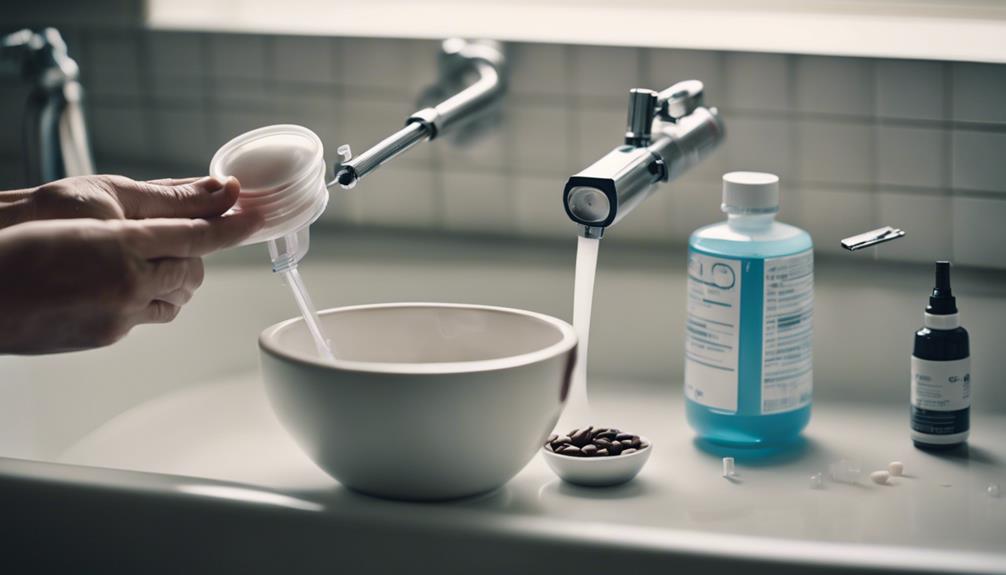Decaf coffee can be a healthier choice if you’re sensitive to caffeine, pregnant, or want to reduce your stimulant intake without giving up coffee’s flavor. It retains most antioxidants and health benefits found in regular coffee, thanks to improved decaffeination methods like Swiss Water, which preserve natural tastes without chemicals. Enjoying decaf allows you to still savor your favorite brew while supporting your overall well-being. To understand how decaf can fit into your lifestyle, keep exploring the details below.
Key Takeaways
- Decaf coffee contains over 97% less caffeine, making it suitable for caffeine-sensitive individuals and pregnant women.
- Modern decaffeination methods, like the Swiss Water Method, preserve flavor and antioxidants without chemical additives.
- Decaf retains most health benefits of regular coffee, including antioxidants that support liver health and reduce disease risk.
- Advances in decaffeination improve flavor quality and lower chemical content, offering a healthier, tastier option.
- Drinking decaf allows coffee lovers to enjoy the taste and health benefits without the stimulant effects or sleep disturbances.

Ever wondered if you can enjoy coffee without the jitters? Decaf coffee might be just what you’re looking for. It provides the rich flavor you love while notably reducing caffeine content. Typically, decaf coffee contains over 97% of caffeine removed, meaning an 8-ounce cup has about 2 mg of caffeine compared to regular coffee’s 95 mg. This makes it ideal if you’re sensitive to caffeine, pregnant, or simply trying to cut back on stimulant intake.
The process of decaffeination involves removing caffeine using different methods, including water, organic solvents, or carbon dioxide. One popular and chemical-free option is the Swiss Water Method. This process uses only water and osmosis to extract caffeine, preserving the coffee’s natural qualities without introducing chemicals. Because of this, many coffee enthusiasts prefer decaf processed via the Swiss Water Method, as it maintains more of the coffee’s original flavor and antioxidants. Speaking of antioxidants, decaf coffee still retains most of the beneficial compounds found in regular coffee. Coffee antioxidants are known for their health benefits, such as supporting liver health and reducing the risk of certain diseases. So, even with lower caffeine levels, you still gain many of the health advantages associated with drinking coffee regularly. This makes decaf coffee a smart choice for those looking to enjoy the beverage’s benefits without the stimulant effects.
Additionally, advancements in decaffeination technologies have improved the preservation of coffee’s natural flavors and health benefits, making modern decaf a more appealing option than ever. If you’re concerned about caffeine sensitivity, decaf coffee can be a game-changer. It allows you to indulge in your favorite brew without experiencing the jitters, anxiety, or sleep disturbances that often come with higher caffeine intake. Plus, reducing caffeine doesn’t mean sacrificing flavor or health benefits.
You get the taste and antioxidants that make coffee so popular, but with a much lower caffeine load. Choosing decaf coffee processed with methods like the Swiss Water Method ensures you’re getting a product with lower caffeine without added chemicals. It’s a healthier option for those seeking to moderate their caffeine consumption while still enjoying the ritual and health perks of coffee. Because decaf retains coffee antioxidants, it continues to support overall health, making it a smart choice for health-conscious coffee lovers.
Whether you’re avoiding caffeine due to sensitivity or just aiming to cut back, decaf coffee offers a flavorful, beneficial alternative that fits into a balanced lifestyle.
Frequently Asked Questions
Is Decaf Coffee Healthier Than Regular Coffee?
You wonder if decaf coffee is healthier than regular coffee. While both offer antioxidants and health benefits, decaf contains much less caffeine, reducing jitters, anxiety, and sleep issues.
If you’re caffeine-sensitive, pregnant, or have health concerns, decaf is a safer option. It provides similar benefits without the stimulant effects, making it a good choice for maintaining your health while enjoying your coffee.
Is There a Downside to Decaf Coffee?
You might wonder if there’s a downside to decaf coffee. While it generally offers fewer caffeine-related issues, it can still cause acid reflux or gastrointestinal discomfort.
Plus, some decaf varieties have residual chemicals or increased cholesterol levels in sensitive individuals. You also risk losing antioxidants and flavor during processing.
Is It Healthier to Be Caffeine Free?
You might wonder if being caffeine-free is healthier. Without caffeine, you avoid side effects like jitters, insomnia, and increased heart rate.
It also reduces risks linked to high caffeine intake, such as high blood pressure and heart problems. Plus, it helps you sleep better and lowers anxiety.
If you’re sensitive or pregnant, being caffeine-free supports your overall health, making it a safer choice for many.
Is Decaf Coffee Better for Anxiety?
You wonder if decaf coffee helps with anxiety. Since it contains only about 2 mg of caffeine per cup, it’s usually a better choice if you’re sensitive to caffeine’s effects.
By switching, you may notice fewer jitters, a steadier heartbeat, and less nervousness, which can stabilize your mood.
While trace amounts might still affect some, decaf generally offers a safer, more comfortable option for managing anxiety symptoms.
Conclusion
So, if you’re looking to enjoy coffee without the jitters or sleep troubles, decaf might be your best bet. It offers the rich flavor you love with less caffeine, making it a better choice for sensitive folks. Just remember, it’s not completely caffeine-free, so moderation is key. Overall, switching to decaf can help you savor your favorite brew while keeping your health in check. Cheers to a gentler coffee experience!









